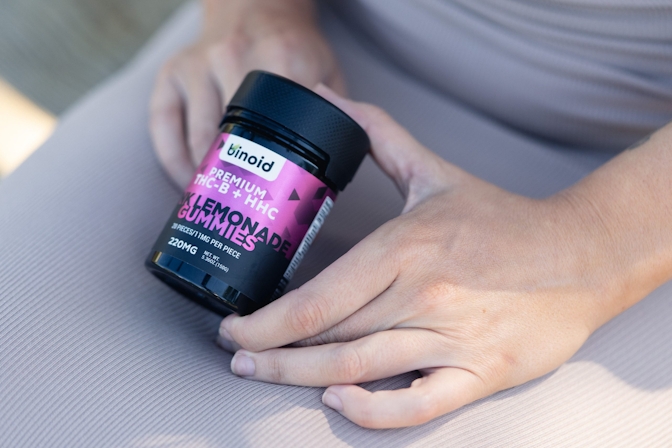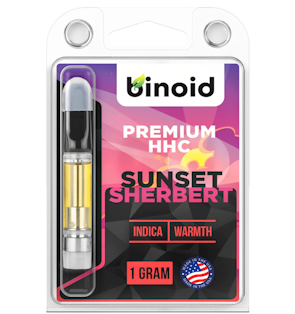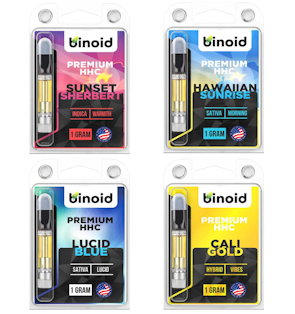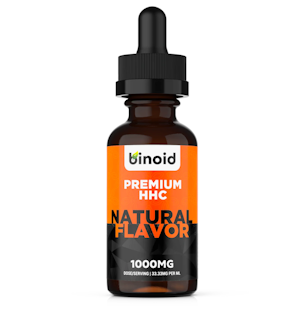
Photo Courtesy of Binoid
Many consumers across the United States are on the hunt for a safe yet potent legal alternative to THC. Ever heard of HHC?
Hexahydrocannabinol (HHC) is another hemp-derived cannabinoid quickly making its way into vape shops, convenience stores, and online outlets nationwide. But can you trust commercial HHC products, and just how potent is this psychoactive substance?
Let’s see what scientific literature and user reports have to say about HHC.
What Is HHC?

Photo Courtesy of Binoid
HHC is a semi-synthetic, unusual homologous cannabinoid made by adding hydrogen atoms to the THC molecule through a process called hydrogenation. It’s semi-synthetic because it’s still available in hemp and cannabis plants, but only in trace amounts. So, labs will alter the chemical structure of hemp-derived cannabinoids to reflect the chemical compounds of HHC.
The result? HHC still interacts with the body’s endocannabinoid system just like Delta-9 THC, but with a few key differences:
- HHC has additional hydrogen atoms that replace the double bonds in THC, making it less likely to oxidize and degrade, which means a longer shelf life.
- This structural difference also affects how HHC interacts with the body’s cannabinoid receptors; you’re likely to experience different effects compared to other cannabinoids like Delta-8 THC and Delta-9 THC.
The European Monitoring Centre (EMCDDA) classifies HHC as a recent, new psychoactive substance that has a large user base and, thankfully, no serious adverse effects as of yet. The agency has noted that more research is still needed to fully understand its safety and potential health effects.
The Most Common HHC Questions (With Answers)

Photo Courtesy of Binoid
What is HHC weed?
“HHC weed” is simply cannabis or hemp products infused with HHC. Weed can’t contain enough HHC naturally to be accurately marketed and sold as HHC weed. So, HHC products are typically made by infusing hemp flower with HHC distillate.
These products include vape cartridges, HHC gummies, tinctures, and flower sprayed or infused with HHC extract. That process extends to other cannabinoid products like Delta-8 THC and more federally legal Delta-9 THC alternatives.
This sticky HHC Flower from Bloomz is a prime example. It’s covered in premium 99% HHC distillate for rich flavors and a slow burn. Choose from strains like Apple Fritter, Green Goblin, Grape Zkittlez, and Monster Cookies, and get yours in 3.5g or 7g.
Is HHC synthetic?
Yes and no. HHC does occur naturally in cannabis plants, but in extremely small quantities. That means commercial HHC products are primarily made through a chemical process called hydrogenation. It’s simple: Add hydrogen atoms to convert cannabidiol (CBD) or other cannabinoids into HHC.
Because the process starts with hemp-derived compounds and mimics something that exists naturally, some brands avoid calling HHC “synthetic.” But scientifically speaking, it’s still a lab-altered cannabinoid.
Does HHC get you high?
Yes, HHC will get you high. Whether it gets you as high as Delta-9 THC is the question. Many users report that HHC has pretty strong psychoactive effects, including euphoria, altered perception, and general relaxation.
That’s because HHC interacts with the same cannabinoid receptors as THC, particularly the CB1 receptors that influence mood and sensation. That said, HHC is slightly milder than Delta-9 THC and may be less likely to trigger anxiety and paranoia. As with any weed product, the intensity depends on dosage, your tolerance, and the specific HHC product itself.
If you’re after maximum flavor and effects, this vape cart will do just the trick. Binoid’s Sunset Sherbet HHC Vape Cartridge reaches 94% HHC distillate levels and 6% terpenes in a 100% hemp-derived formula (aka, fully legal).

Eli Defaria / Unsplash
How strong is HHC?
HHC is known to be about 70-80% as potent as classic Delta-9 THC. That makes it stronger than Delta-8 THC (which is about half as potent as Delta-9) but less intense than D9.
Don’t underestimate the psychoactive effects of HHC—think of HHC flower as an 18-23% THC strain. Not incredibly potent, but can have stronger effects in higher doses.
How long does HHC high last?
Expect the HHC high to last about 2-4 hours, sometimes reaching 4-6 hours with higher doses or edible products. Cannabis vaping and smoking usually produce shorter effects than edibles.
What does HHC feel like?
HHC produces similar effects to delta-9 THC but at a less powerful scale. It’s often more physically relaxing and less mentally stimulating than D9, making it great for general relaxation, increased sensory awareness, and mood enhancement.
People love HHC products specifically for their clear headspace compared to THC, while still delivering pronounced body effects.
This HHC Vape Cartridge Bundle from Binoid maximizes the potency of HHC with a clean 94% HHC distillate along with 6% cannabis terpenes. Get yours in a 4-pack or 6-pack and receive strains like Sunset Sherbert, Hawaiian Sunrise, Cali Gold, and Lucid Blue.

Photo Courtesy of Binoid
How long does HHC stay in your system?
HHC usually stays detectable in your system for about the same time as other cannabinoids—approximately 2-5 days for occasional users and up to 30+ days for heavy, regular consumers.
Does HHC show up on a drug test?
Yes, regular drug tests for cannabis might detect HHC or its metabolites. It’s not 100% certain, but there’s a pretty high risk. Even though HHC has a different GC-MS metabolite profile than Delta-9 THC, these cannabinoids share structural similarities that might trigger a positive result on a standard drug test, especially with existing and emerging modalities.
How to get HHC out of your system?
Do the same as you would with other cannabinoids: stay hydrated, do light exercise (avoid right before a drug test) to burn fat where cannabinoids are stored, try one of these detox methods, and wait.
While those tips can help, time is your best bet. HHC can be detected in new users for about 1-3 days, while frequent or heavy users can test positive for over 30 days.

Photo Courtesy of Binoid
Does HHC have THC in it?
No. HHC is just that—its own cannabinoid. HHC and THC have their own unique chemical structures. That said, some commercial HHC products may contain other cannabinoids like Delta-8 or Delta-9 THC for an enhanced entourage effect and a more balanced, true-to-plant experience.
A good example is these THC-B + HHC Gummies from Binoid. They contain 10mg of HHC per gummy alongside 1mg of one of the strongest cannabinoids on the market: THC-B. They’re stronger than the brand’s old THC-O gummies and come in 4 options: Berry Banana, Blue Razz, Pink Lemonade, and Mixed Gummy. Definitely take half a gummy to start—these gummies are strong.
What's the difference between HHC and THC?
The key difference between HHC and THC is their chemical structure. HHC has additional hydrogen atoms and no double bonds, while THC contains double bonds. That difference gives HHC a few things:
- More stability and longer shelf life
- Takes longer to oxidize and degrade
- Produces more physical vs. cerebral effects
This structural difference also makes HHC federally legal (with state restrictions) when derived from hemp containing less than 0.3% Delta-9 THC on a dry weight basis.
How is HHC made?
HHC is made by taking hemp-derived cannabinoids like CBD and putting them through a process called hydrogenation. That just means adding hydrogen atoms to the molecule, which changes its structure and removes some of the double bonds.
This isn’t something you should ever attempt at home. Converting cannabinoids like CBD to HHC should be left to the professionals in lab coats, as HHC production takes specialized equipment, heavy metals like platinum or palladium, high pressure, and careful temperature control.

Photo Courtesy of Binoid
Does HHC make your eyes red?
Yes, HHC can cause red eyes just like Delta-9 THC, but likely to a lesser degree. Both cannabinoids can dilate blood vessels and reduce blood pressure, which increases blood flow to the eyes.
Does HHC help with pain?
It might. Many users say HHC offers more physical relief than a strong, heady high. While it’s not quite as strong as Delta-9 THC, HHC is estimated to be about 70–80% as potent and is often associated with relaxation, comfort, and easing pain perception.
The most straightforward way to experience it? Tinctures. They don’t have the drawbacks of smoking and vaping, and they contain just HHC along with a carrier oil.
Binoid’s HHC Tincture is packed with 1000mg of premium 92% HHC distillate paired with MCT oil with a helpful dropper to measure your doses. Start with 1/4 to 1/2 drop, and expect effects within the hour. Need more? Gradually increase your dose the next time.
Does HHC help you sleep?
HHC can help with the physical aspects of falling asleep. While there are potential benefits with the endocannabinoid system, like reduced stress and anxiety, HHC is specifically sought after for its physical bliss and overall comfort provided.

Photo Courtesy of Binoid
Does HHC make you horny?
There’s no concrete scientific evidence that HHC makes you horny. There might be indirect effects that benefit libido, but nothing you should rely on for a boost in the bedroom.
Any aphrodisiac properties likely relate to HHC’s broader effects on mood, sensory enhancement, and relaxation rather than direct hormonal action.
Why does HHC make me cough?
It’s not just HHC that will make you cough, but smoking or vaping anything is likely to do it. Coughing stems from throat irritation and is affected by things like vape temperature, product purity, cutting agents, and personal sensitivity.
Some early research in Pulmonary Toxicology found that vaping CBD (not HHC specifically) caused significant lung inflammation, tissue damage, and oxidative stress in mice, even greater than nicotine. So, cannabinoid vapor in general may cause coughing, not just the HHC cannabinoid alone.
How is HHC legal?
HHC, derived from hemp with less than 0.3% Delta-9 THC on a dry weight basis, is technically legal in the United States. It’s compliant with the 2018 Farm Bill since it’s not HHC but an entirely other cannabinoid.
While it’s mostly legal to ship nationwide, the legal status of HHC varies by state, with some banning HHC and other hemp-derived cannabinoid products altogether.
Is HHC safe?
HHC is generally considered safe, but its full safety profile is still being studied. Many users report similar effects to Delta-9 THC, like dry mouth, red eyes, and the feeling of being “high,” just at a slightly lesser strength.
As with any psychoactive substance, there’s always the risk of dependency and abuse. It’s always best to consult with a healthcare provider before using HHC, especially if you have pre-existing health conditions, to avoid potential side effects or drug interactions.
Herb Recommended Products:
READ MORE















